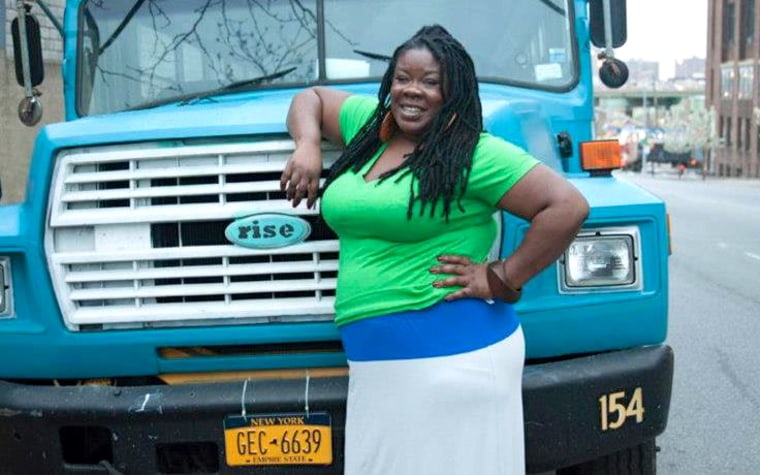The MHP Foot Soldier this week is Tanya Fields, who saw environmental injustice in her community and decided to do something about it. She has created a mobile produce bus to address the issue of food access in New York City's South Bronx, and has converted the bus into a clean energy vehicle to ensure she was not contributing to air pollution problems.
Fields also runs the BLK Projek, which addresses food justice through an economic development lens, creating job opportunities for women and youth of color.
She began doing guerrilla gardening in underdeveloped parks and lots in her community, and found community members were interested in getting involved in the work. However, she ran into problems with permits and tension with the local police and city government. After gaining the support of councilperson Maria del Carmen Arroyo, Fields decided to begin a farmer’s market, but felt the community didn’t support the idea in the way she had imagined.
Before appearing on Saturday's Melissa Harris-Perry, Fields talked to MSNBC about how that process led her to developing the South Bronx Mobile Market, LLC.
In your piece in The Root, you mentioned that before you moved your family to the Bronx, you did not realize that the tradeoff was you would no longer be able to access healthy foods. Can you talk to me more about that?
I actually moved to the Bronx in 2003 when I was 23 years old and I had a three-month-old child. And so for me, I wasn’t thinking about food. I was looking to find a place close to the train station so I could get to work and to school–I was still in college and working full time–and can I find a place that is affordable.
What led you to start the kind of food activism work you do now?
I know a lot of people look for me to have some sort of answer that’s a little more selfless than what I’m about to say, but I got into this work to save my life, to save my daughter’s life.
In the course of living here, I gained about 40 pounds! And some of it was from having children, but a lot of it was that I found myself eating at McDonald's every day. And it wasn’t like I didn’t know any better--but I was a very stressed out, young woman with children and not a lot of money. And these places were what were within walking distance from me and they were cheap. And on top of that my second daughter had been diagnosed within her first year with asthma, and we could see really quickly that it was chronic.
But I did know that I had the ability to have access to people that have more resources. Through my education I have the ability to be more aware of what was happening to me, and I had the language to be able to articulate that. So I felt very much like I was obligated to do something about it.
And so I found an organization called Mothers on the Move and I started getting involved. I started learning all of the different things that were happening in my community. The 16,000 diesel-truck trips that we get every day, most of it attributed to the transportation of food, but almost none of that food comes into our community.
The air quality here contributes to my daughter’s chronic asthma, 32 open airways transfer stations in the South Bronx. At that time we had an awful treatment plant that processed 70% of the city’s municipal waste, coming through our community on trucks.
And I just got angry. And I wanted to direct that anger somewhere positive.
What were your main goals when you started the BLK Projek? What were you trying to accomplish?
For me at that time my goals were to create–very broadly–I just wanted to help create a more holistic, healthy community for women and youth.
I started… with some Mommy and Me yoga classes… we kind of had a healing circle after those classes... And the thing that kept coming up was like, “It’s very hard for me to get healthy when I have to worry about my child’s education, when I’m working in the park for welfare, when I’m in a domestic violence situation, when I’m on and off my meds for mental health, when I’m chronically underemployed…”
And so I’m like, if I’m going to do food, I need to do food from a perspective that will create economic development opportunities.
Watch Fields' interview with host Melissa Harris-Perry about her work from Saturday's show.
